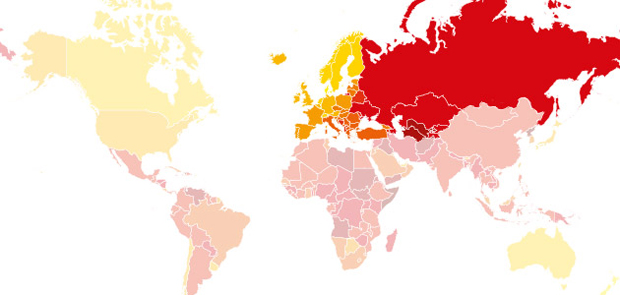Perhaps it should come as no surprise that out of 175 countries in the 2014 Corruption Perceptions Index, the once great economic hope of many – Turkey – suffered one of the biggest drops in score (down five points to 45 out of 100 on a scale where 0 is highly corrupt and 100 very clean). Images of gold bars and millions of dollars stuffed in shoeboxes, coupled with incriminating videos, the firing or resignation of government ministers, multiple arrests and sadly, a number of suicides, topped the list of stories this year involving endemic corruption at the highest levels of Turkey’s business and government.
Too bad the government response was a crackdown on political enemies as well as thousands of police officers, prosecutors and regulators who were sacked or “reassigned”, and not the corrupt. The multi-headed corruption scandal was preceded by massive citizen protests last year and a mining tragedy in May of this year directly related to corrupt practices. This has all taken the shine off Turkey with its nearly double-digit growth rate now suffering a similar decline to its Corruption Perceptions Index score.
Secret gold also featured in the revelations of corruption that engulfed the Ukraine, another poor performer in this year’s index (a score of 26 out of 100). Pictures of a two kilogram solid gold bread loaf and a golden toilet – both found in ousted president Viktor Yanukovich’s abandoned estate – were potent symbols of the endemic corruption in the country.
Yanukovich fled the country in February this year after the people of Ukraine protested the profligate corruption that marked his rule. In the end more than 100 people were killed trying to speak up against corruption, a brave and shocking moment for us all. It’s easy to blame individual corrupt figures, but Yanukovich’s massive money laundering was only possible with the help of willing western banks and middlemen, something EU governments have failed to tackle.
That’s why Transparency International has begun an international campaign to Unmask the Corrupt. The first step in this long road is for countries to make companies much more transparent so they cannot easily be used to illicitly launder stolen wealth. The real, hidden owners of companies are sometimes corrupt, and they must not be able to ship stolen cash across the world. That’s why we ask every country to create a register of the real beneficial owner of every company operating on its soil and to make that register public.
The countries of the European Union indeed have higher index scores than countries further east. But corruption scandals are not limited to Ukraine and Turkey. This year has been marked by numerous scandals in the heart of “old Europe”: in France, Spain and Italy they included a former president, a current regional president and members of the royal family, not to mention dozens of politicians and influential business people. EU citizens also protested against corruption this year in Spain, Romania, Bulgaria, Hungary, Czech Republic and Slovakia.
The Corruption Perceptions Index scores in many of the countries of the European Union remain unchanged or have improved slightly. In part, this is because the economic situation has stabilised, at least at present, and in some cases, governments are starting to tackle endemic corruption.
Although incomplete and piecemeal, the reforms that have been started in Greece, for example, suggest an explanation as to why it has moved up the rankings by three points (and up seven points in the last two years to a score of 43 today).
We also welcome the gradual progress made by the UK in the last few years, which saw its score increase by two points, indicating the effectiveness of the Bribery Act on the UK’s international reputation. But there is more to do, the UK should be in the top 10. The result next year may depend on the government’s upcoming anti-corruption action plan and whether the new government, post-May, sticks to commitments made within it.
Denmark, at the top of the index again and up one point, with a strong rule of law, support for civil society and clear rules governing the behaviour of those in public positions, also set an example when it recently announced plans to create a public register including beneficial ownership information of all companies incorporated in Denmark. Two other Nordic countries, all relatively very strong performers on the index, nevertheless either saw some decline (Sweden down two points), or were flat as in Finland.
A combination of corruption scandals and increasing awareness of the need for greater transparency and less favouritism is reflected throughout the Europe and Central Asia region, even in the cleanest countries.
The way business and other vested interests use political connections to influence public decision-making is at best opaque and often secret. In a forthcoming Transparency International report on lobbying in 19 countries in the European Union, no country comes even close to having ideal safeguards in place to promote open and ethical lobbying.
















 Connect with us on Facebook
Connect with us on Facebook Follow us on Twitter
Follow us on Twitter